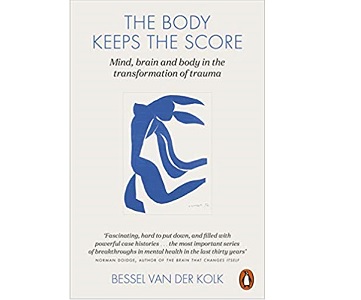
This week I have mostly been reading The Body Keeps the Score by Bessel Van Der Kolk
This is a Magnum Opus by any standard. That is its curse and its prize. It is a magnificent contribution to our collective understanding of trauma.
Advances in neuroscience and brain imaging have made it possible to understand what happens to people who experience trauma. If experienced as a child, abuse, violence or neglect produces physiological changes in the way a child’s brain and body develops. An ACE study has shown that child abuse and neglect is the single most preventable cause of mental illness; the single most common cause of drug and alcohol abuse and a significant contributor to diabetes, heart disease, cancer, stroke and suicide. According to one research scientist, “resilience in adulthood could be predicted by how lovable mothers rated their kids at age two”.
Later life trauma is very different. Assuming at least one decent parent and a fairly stable early life adults who experience trauma are better able to recover. Although recovery for adults and children is possible – with the right support.
The author tells the story of a Vietnam veteran who suffered from PTSD. He had be involved in an ambush that saw his platoon wiped out, including his best friend. That was the story he shared. What he was reluctant to share was what he did in response. Filled with rage, he went to a near-by village and committed a number of war crimes. It was the shame of that action that was keeping him locked in the trauma. As one therapist said, “The greatest sources of our suffering are the lies we tell ourselves”.
Another revelation that just floored me came from Martin Seligman’s research on learned helplessness. I am a dog lover so I hated reading about his experiments on dogs. At least they provided a profound insight – scared animals return home regardless of whether home is safe, painful or frightening. And the same goes for human beings. If trauma beats us down and makes us feel helpless our brain literally changes so that we will continue to return to it. This is why people stay in abusive relationships, it is why people return to their traffickers even when they have been released. It’s not weakness or because they secretly like it – it’s biology. Everyone should know that. https://www.amazon.co.uk/Body-Keeps-Score-Transformation-Trauma/dp/0141978619/
When is a Book Too Big?
This book highlights the incredible information in books AND the struggle to get it to the people who need it. It’s a brilliant book but it’s also over 400 pages long. In the course of my work as a ghostwriter I learn a lot of stuff and read countless books. Some contain information that we should all know and yet most of it will never become common knowledge. Most of us don’t even finish the books we start and 400 pages certainly doesn’t help. But that is the quandary – we live in a soundbite world of tweetable quotes and short attentions spans. Are we losing the ability to concentrate and immerse ourselves in a 400-page book? And if so, are we closing a door that could transform our lives?
My passion is working with genuine experts to ‘simplify up’ this type of really important information. Making it as easily accessible and practical as possible so that the reader can get to the crux quickly. That way, this critical expert knowledge can reach the people who so desperately need it.

This blog series is in homage to Jesse’s Diet’s, the comedy sketch from The Fast Show where Jesse pictured above comes out his shed and utters the immortal words… Followed by nonsense such as “Bourbon Biscuits” or “Prozac”.

